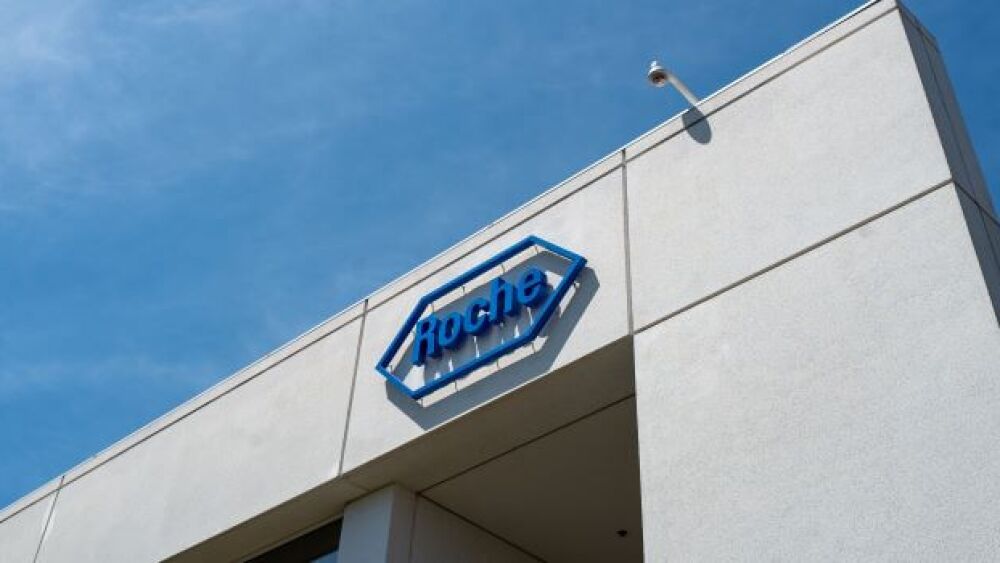Repare Therapeutics announced a global cancer collaboration valued at up to $1.2 billion with Swiss pharma giant Roche for the development and commercialization of camonsertib.
Courtesy of Smith Collection/Gado/Getty Images
Shares of Repare Therapeutics are soaring more than 27% in premarket trading following the announcement Wednesday of a global cancer collaboration valued at up to $1.2 billion with Swiss pharma giant Roche for the development and commercialization of camonsertib.
Under the licensing and collaboration deal, Roche will assume the development of camonsertib, also known as RP-3500, a potent and selective oral small molecule inhibitor of Ataxia-Telangiectasia and Rad3-related protein kinase (ATR) that has been in development for the treatment of tumors with specific synthetic-lethal genomic alterations, including those in the Ataxia-Telangiectasia mutated kinase (ATM) gene. Camonsertib is a precision oncology asset designed to attack genetic defects in cancer tumors and prevent those cells from repairing themselves, leading to the death of the tumor.
The drug is being assessed in smaller patient groups based on the genetic makeup of their tumors. The partnership with Roche comes about two months after Cambridge, Mass.-based Repare touted data from the ongoing Phase I/II Trest study assessing camonsertib in solid tumors, including those in the ATM gene.
Data presented at the American Association for Cancer Research Annual Meeting showed that treatment with camonsertib demonstrated clinical benefit as a monotherapy in patients with solid tumors who have various genotypes, BioSpace reported at the time. Efficacy was observed in patients diagnosed with ovarian cancer, those with tumors harboring BRCA1 and BRCA2 genomic alterations, as well as patients with ATM loss-of-function tumors.
Kim Seth, executive vice president and head of business and corporate development at Repare, said camonsertib has the potential to benefit cancer patients as a monotherapy for different solid tumor types. There is also the potential that camonsertib will work in combination with other cancer therapeutics.
“Given the encouraging data Repare has generated for camonsertib as a potentially best-in-class ATR inhibitor with a promising tolerability profile and patient selection insights in areas of high unmet medical need, and Roche’s leading global footprint and unique expertise in precision oncology, we are confident that Roche is the ideal partner for us to drive the broad global development and commercialization of camonsertib,” Seth said in a statement.
Roche will now assume the development of camonsertib. The company has the option to expand development into additional tumors and multiple combination studies.
James Sabry, global head of pharma partnering for Roche, expressed excitement about the potential of camonsertib and its possible role in treating cancer. He said the Swiss company is excited about the emerging DNA damage response field, which they believe is a promising new approach to precision oncology.
“We are looking forward to partnering with Repare Therapeutics to further develop camonsertib as a new potential treatment option for patients with significant unmet medical needs across a range of tumor types. The collaboration with Repare builds on Roche’s strategy of personalized healthcare and further strengthens our leadership in oncology,” Sabry said in a statement.
Under the financial terms of the deal, Roche will pay Repare $125 million in upfront funds. Repare is also eligible to receive up to $1.2 billion in potential milestone payments, which includes up to $55 million in potential near-term payments. Repare will also be eligible for royalties on sales of camonsertib if it is approved.
Additionally, the collaboration also provides Repare with the ability to opt-in to a 50/50 U.S. co-development and profit share arrangement. The company noted that If Repare chooses to exercise its co-development and profit share option, it will continue to be eligible to receive certain milestone payments, as well as royalties on sales outside of the United States.





